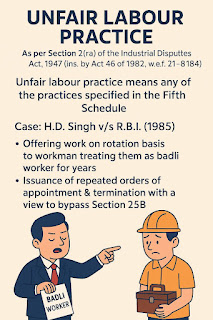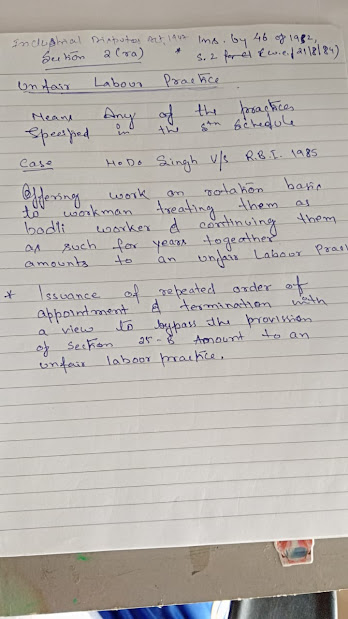Understanding Unfair Labour Practices under the Industrial Disputes Act, 1947
Introduction
The Indian labour law framework aims to ensure fairness, security, and dignity for workers while maintaining industrial peace and discipline. One of the key pillars in this framework is the concept of Unfair Labour Practices, enshrined under the Industrial Disputes Act, 1947. These are practices deemed exploitative or unjust, typically used by either employers or workers/unions, which undermine the spirit of equity and fairness in industrial relations.
Legal Basis: Section 2(ra) and Fifth Schedule
The term "Unfair Labour Practice" was introduced by the Industrial Disputes (Amendment) Act, 1982 and came into force on 21st August 1984. It is defined under:
📜 Section 2(ra) of the Industrial Disputes Act, 1947:
“Unfair labour practice” means any of the practices specified in the Fifth Schedule.
The Fifth Schedule of the Act lays down two categories:
- Unfair labour practices by employers and their trade unions
- Unfair labour practices by workers and their trade unions
Examples of Unfair Labour Practices by Employers
1. Hiring workers on a temporary/contractual basis (e.g., badli workers) for long durations to deny them regular benefits.
2. Rotating employees continuously to avoid regularization.
3. Repeated termination and reappointment to evade the application of Section 25B of the ID Act, which pertains to continuous service and rights under retrenchment laws.
4. Interference with trade union activities, or victimization of workers for union involvement.
5. Discouraging collective bargaining or refusing to engage in negotiations in good faith.
---
Key Judicial Interpretation: H.D. Singh v/s Reserve Bank of India (1985)
In this landmark case, the Supreme Court ruled that:
Continuously offering work on a rotation basis while labeling employees as “badli” workers, and treating them as such for years together, amounts to Unfair Labour Practice.
The RBI had repeatedly engaged workers without regularizing their services, violating their right to job security. The court emphasized the employer’s duty to avoid artificial practices meant to bypass statutory protections.
Bypassing Section 25B: A Common Abuse
📌 Section 25B of the ID Act defines what constitutes continuous service. Many employers resort to:
- Repeated short-term appointments
- Gaps in service
- Backdated terminations and re-hires
This is done with an intent to deny retrenchment benefits, gratuity, or regularization. Courts have condemned this as a malicious and manipulative practice, amounting to an Unfair Labour Practice.
---
Consequences of Unfair Labour Practices
- Employers found guilty of engaging in such practices can face:
- Directions to cease and desist from such practices
- Orders for reinstatement with back wages
- Penalties under Section 25U, which include imprisonment up to six months or fine or both
---
Conclusion
The inclusion of Unfair Labour Practices in the Industrial Disputes Act, 1947, reflects a progressive move to protect workers from systemic exploitation. However, enforcement remains a challenge. Both employers and employees must be aware of these legal safeguards to build a more equitable industrial environment.
A fair workplace is not just a legal requirement — it is a foundation for sustainable industrial harmony.


Comments